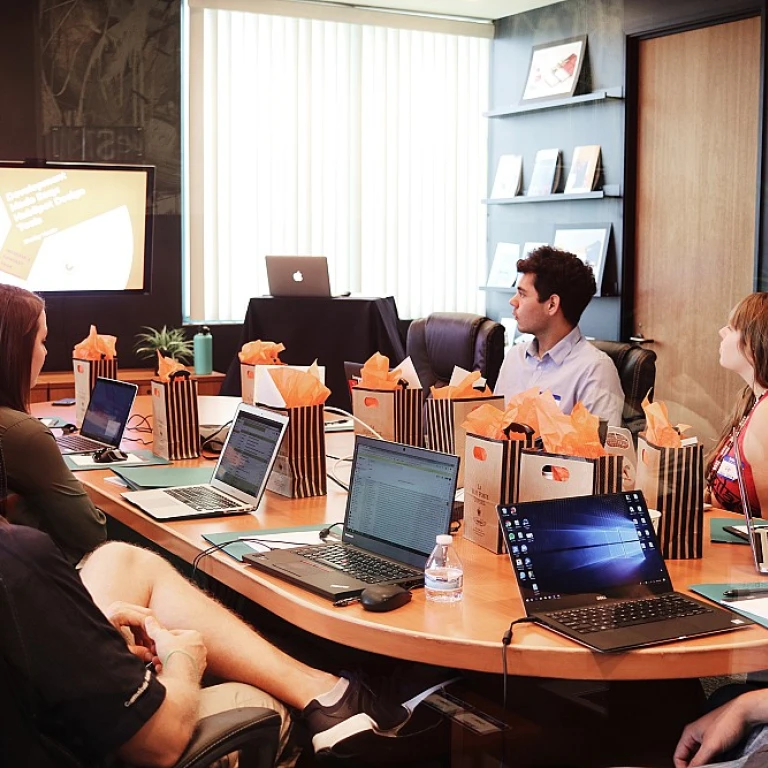AI in Talent Acquisition: The Game Changer
### Redefining the Talent Acquisition Landscape with AI
Artificial intelligence has evolved from a buzzword in the recruitment industry to a disruptive force, reshaping how companies find and hire talent. The advent of AI in talent acquisition promises a more efficient, accurate, and scalable way to source candidates, making it a game changer for hiring managers and recruiters.
Harnessing AI in candidate sourcing brings numerous advantages to the table. By analyzing extensive datasets and learning from anonymized applications, AI algorithms can quickly pinpoint the most suitable candidates for a role. This technological prowess not only shortens the time-to-hire but also significantly improves the quality of the candidate pool.
Among the prominent benefits of AI in talent acquisition is its ability to mitigate unconscious bias. By focusing solely on the qualifications and experiences that align with specific requirements, AI helps create a fairer and more inclusive recruitment process.
Moreover, AI-driven systems are continuously learning and improving, making them increasingly adept at recognizing nuanced patterns in candidate data. Consequently, these systems excel at predicting future job performance and cultural fit, two pivotal factors in successful hiring.
To delve deeper into how AI is spearheading changes in candidate sourcing, refer to this
detailed examination of AI's impact on recruitment.
As companies embrace this game-changing technology, the integration of top AI-powered recruiting tools can further refine the candidate sourcing process. These tools, discussed in the next section, optimize each step of recruitment and offer innovative solutions for reaching today's top talent.
Revolutionizing Recruiting with AI Tools
The wave of artificial intelligence sweeping through candidate sourcing has brought with it a suite of powerful recruiting tools, each promising to make the hiring process more efficient and effective. These tools are indispensable for modern recruitment teams looking to maintain a competitive edge. Let's delve into some of the top AI-powered tools reshaping the recruitment landscape.
AI-Powered Resume Screening
AI-driven software is replacing the tedious manual process of sifting through countless resumes. Modern tools can quickly screen through resumes, identifying key qualifications and experience that align with a given job description. By utilizing sophisticated algorithms, these solutions not only save time but also reduce the margin of human error, ensuring that only the most suitable candidates are shortlisted.
Chatbot Interactions for Initial Candidate Engagement
Candidate engagement right from the outset is crucial, and conversational AI is playing a significant role here. With the help of AI chatbots, recruiters can automate initial interactions with potential candidates. These chatbots are designed to answer common queries, schedule interviews, and even perform preliminary assessments. This experience not only makes candidates feel valued but also expedites the hiring process.
Predictive Analytics in Recruitment
The power of AI extends further into predictive analytics, a tool that has transformed recruitment strategies. By analyzing patterns and historical data, predictive analytics helps recruiters foresee candidate success within a specific role. This capability allows hiring managers to make informed decisions and optimize their recruitment strategies accordingly.
For an in-depth understanding of how these tools fit into developing effective recruitment strategies, you might want to explore insights on
automating the art of finding the right candidates. This knowledge can significantly help in making precise hiring decisions and streamlining the candidate sourcing journey.
Engaging Passive Candidates with AI
Nurturing Future Talent: Engaging Passive Candidates with AI
Engaging passive candidates has traditionally been a challenging feat in the recruiting world. These individuals, while not actively seeking new opportunities, often possess the skills and experience that make them prime candidates for many organizations. With the advent of AI in talent acquisition, a transformation has occurred in how we approach these potential hires.
One of the most exciting developments in this space is the capability of AI to scour large pools of data and identify passive candidates who may not be immediately visible through traditional sourcing methods. By analyzing social media profiles, online forums, and other digital footprints, AI can highlight individuals who have the skill sets and career trajectories aligned with an organization's needs.
AI-powered recruiting tools provide a deeper understanding of candidate profiles, allowing recruiters to craft personalized outreach strategies. This level of customization not only captures the attention of passive candidates but also fosters a relationship-building process that humanizes the approach, even when technology is at the forefront.
In addition to identification and personalization, AI can assist in predictive analytics, helping recruiters anticipate the likelihood of a candidate's interest in a new role. By evaluating engagement levels and analyzing patterns in career moves, AI offers recruiters vital insights into the best time and way to reach out to passive candidates.
The integration of data-driven decision-making as discussed in earlier sections becomes even more crucial here. By applying AI's analytical capabilities, recruiters can prioritize outreach efforts, channeling resources effectively to where they might yield the best results. You can find more about these advanced strategies by exploring
how data-driven candidate sourcing works.
While AI offers incredible tools for engaging passive candidates, the human element remains essential. The technology acts as an enabler, providing recruiters with the information and insights necessary to make informed and empathetic connections. In this intricate dance between technology and human interaction, AI transforms what was once a daunting task into a manageable and strategic process, empowering recruiters to tap into the latent potential of passive candidates effectively.
Data-Driven Decision Making in Recruitment
Leveraging Data for Smarter Decisions
In the ever-evolving landscape of recruitment, the need for data-driven decision-making has become paramount. Artificial intelligence plays a crucial role in this transformation, offering a myriad of benefits that can revolutionize traditional hiring processes. By harnessing the power of AI, organizations are able to utilize data insights that lead to more informed and strategic recruitment decisions.
One of the primary advantages of employing AI in candidate sourcing is its ability to analyze vast amounts of data with unparalleled speed and accuracy. This level of analysis allows recruiters to identify patterns and trends that would otherwise remain hidden. For example, AI algorithms can sift through resumes and application data to predict the best candidates for a role by analyzing previous successful hires' attributes. This predictive capability can take the guesswork out of filtering through numerous applicants and streamline the selection process.
Furthermore, AI-driven data analytics can provide insights into candidate demographics, improving diversity and inclusion in the workplace. Recruiters can assess these data points to ensure job openings are reaching a broad and varied audience, potentially widening the talent pool. By reducing unconscious bias, AI supports a more fair and equitable recruitment process.
AI tools are also adept at evaluating the efficiency of recruitment campaigns, offering feedback and suggestions for refinement. With these insights, recruiters can continually optimize their strategies, ensuring they are targeting the right candidates and using the best channels for engagement. This constant feedback loop is vital for staying ahead in a competitive job market.
This data-centric approach also extends to internal workforce analytics, where AI helps HR teams foresee potential challenges, such as skill gaps or turnover risks, and take proactive measures. The ability to anticipate and address such issues can significantly impact organizational success and employee satisfaction.
As AI technology continues to evolve, recruiters will find themselves armed with ever more sophisticated tools to support data-driven decision-making. While challenges exist, such as ensuring data privacy and overcoming integration hurdles, the potential rewards far outweigh the difficulties. Embracing AI's analytical capabilities can lead to a more efficient, effective, and fair recruitment process, ultimately benefiting both employers and candidates alike.
Integrating AI with Existing Systems
Enhancing Existing Recruitment Frameworks
Integrating artificial intelligence (AI) into established recruitment systems is no small feat, yet it holds the key to revolutionizing how talent acquisition operates. The seamless blend of cutting-edge AI with traditional recruitment processes empowers businesses to remain competitive and efficient. As recruitment teams begin this integration, it's crucial to approach it with strategies that streamline operations and amplify output.
One of the most significant advantages of merging AI with current systems is the elimination of repetitive tasks. AI-powered recruiting tools can automate mundane tasks such as resume screening and initial shortlisting. This frees up valuable time for recruiters to focus on more strategic components of candidate engagement. Moreover, AI can enhance the quality of candidate analysis, offering deeper insights into skills and cultural fit.
However, incorporating AI into existing frameworks isn't just about slapping on a new tool; it requires careful planning and execution. Companies should engage in a detailed analysis of their current recruitment methods, identifying pain points and areas where AI can offer tangible benefits. The integration should align with the company’s broader human resource goals, ensuring coherence in talent acquisition strategies.
Furthermore, to fully leverage AI’s potential, it's essential that recruitment teams undergo training tailored to understanding AI systems and analytics. This will enhance their ability to interpret AI-generated data, leading to more informed, data-driven decision-making in recruitment. As explored earlier, AI is a game changer, transforming not just the how, but the why behind candidate sourcing decisions.
Lastly, it’s vital to maintain a human touch in the AI integration process. The candidate experience should remain a top priority, ensuring that the technological enhancements serve to build, rather than hinder, relationships. In addition to overcoming challenges and fostering engaging conversations with potential hires, this balanced integration approach will ensure that AI in candidate sourcing delivers its promised potential.
Overcoming Challenges in AI Candidate Sourcing
Navigating the Complexities of AI Integration
As we delve into the transformative impact of AI on candidate sourcing, it's essential to address the challenges that arise when integrating AI into recruitment processes. While AI offers remarkable efficiency and precision, its implementation is not without hurdles.
One significant challenge is ensuring the seamless integration of AI systems with existing recruitment platforms. Many organizations rely on established systems that have been in place for years, and introducing AI requires careful planning and execution. Compatibility issues can arise, necessitating updates or overhauls of current systems to fully leverage AI's capabilities. This process can be resource-intensive and requires a strategic approach to minimize disruptions.
Another critical aspect is the ethical considerations surrounding AI in recruitment. As AI systems become more prevalent, concerns about bias and fairness have come to the forefront. AI algorithms are only as unbiased as the data they are trained on, and if historical data contains biases, these can be perpetuated in AI-driven decisions. Organizations must prioritize transparency and fairness by continuously monitoring and refining their AI systems to mitigate these risks.
Moreover, the human element in recruitment cannot be overlooked. While AI can streamline processes and provide valuable insights, the importance of human judgment and intuition remains paramount. Recruiters must balance AI-driven data with their expertise to make well-rounded hiring decisions. Training and upskilling recruitment teams to work effectively alongside AI tools are crucial for maximizing the benefits of AI integration.
Lastly, as highlighted in our earlier discussions, data security and privacy are paramount when using AI in candidate sourcing. The vast amount of data processed by AI systems necessitates robust security measures to protect sensitive candidate information. Organizations must ensure compliance with data protection regulations and implement stringent security protocols to safeguard this data.
In conclusion, while AI is indeed a game changer in talent acquisition, overcoming these challenges is vital for successful implementation. By addressing integration issues, ethical concerns, and maintaining a human touch, organizations can harness the full potential of AI in recruitment.








